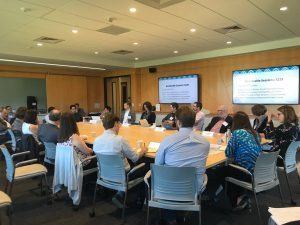Looking Back at Smart Cities Week at FPF
If you’ve been in Washington, DC this week, you may have noticed a certain buzz in the air – and not just from the wifi-connected streetlights on Pennsylvania Avenue. It’s Smart Cities Week, and D.C. has been humming all week with urban leaders, leading companies, tech and civic innovators, open data gurus, and advocates and academics from all around the globe. Throughout the week, these diverse stakeholders have come together to ensure we realize the full potential of smart cities.
Here at FPF, we kicked off the week by convening a roundtable addressing “Privacy in the Smart City: Searching for a Middle Ground.” In a room filled with urban and industry thought leaders, academics, and consumer advocates, we worked to tackle difficult questions about how we can secure the social benefits of connected, data-driven technologies in cities while also protecting individual privacy and autonomy.
Featuring speakers such as Claire Barrett, the Chief Privacy Officer of the U.S. Department of Transportation, Barney Krucoff, the Chief Data Officer for the District of Columbia, and Michael Mattmiller, the Chief Technology Officer for the City of Seattle, the roundtable strove to identify and advance responsible data practices in a hyperconnected world.
That same day, the City of New York and more than 20 partner cities around the U.S. announced a new Guideline for the Internet of Things (IoT) which will provide a framework “to help government and our partners responsibly deploy connected devices and IoT technologies in a coordinated and consistent manner.” The first guideline stresses Privacy + Transparency and calls on cities to “protect and respect the privacy of residents and visitors” and to be “open and transparent about the ‘who, what, where, when, why and how’ of data collection, transmission, processing and use.” Other key commitments focus on Data Management, to ensure data quality and accessibility; Infrastructure, to deploy and use IoT in ways that maximize public benefit; Security, to ensure public IoT systems are protected and resilient; and Operations + Sustainability, to deploy IoT in ways that ensure their financial, operational, and environmental sustainability.
Smart Cities were also the focus of key federal initiatives this week. First, the White House announced over $80 million in new federal investments in the Smart Cities Initiative. This also doubled the number of participating cities and communities, now rising to over 70. The goal of the Smart Cities Initiative is “to make it easier for cities, Federal agencies, universities, and the private sector to work together to research, develop, deploy, and testbed new technologies that can help make our cities more inhabitable, cleaner, and more equitable.”
Later in the week, the White House also hosted its inaugural “Open Data Innovation Summit,” which sought celebrate the growing number of data-sharing initiatives and to ensure that the momentum for open data will continue. With federal databases leading the way, the day highlighted how open government data can spark innovation, drive inclusivity, and improve communities globally.
Of course, one of the greatest risks of opening government datasets to the public is the possibility that individuals may be re-identified from those datasets, compromising citizens’ privacy. Given this key concern, it is especially timely that the National Institute of Science and Technology (NIST) has released a draft of its special publication on “De-Identifying Government Datasets” for comment (to comment, see here). This guidance, by Simson Garfinkel, should be a valuable tool for every government agency.
Throughout the week, these new frameworks and conversations have shined light on several important aspects of the smart city landscape. And while it may not always be easy to balance the risks and opportunities of new civic technologies, or the competing goals of open government and individual privacy, this week proves that we’re off to a good start.
For more information on FPF’s Smart Cities working group, contact Kelsey Finch at [email protected].



